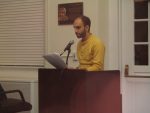Mt. Kisco Weighs Revisions to Solar Power Legislation

Debate over Mount Kisco’s solar power law simmered last week as revisions were proposed to the legislation but questions arose over why a solar company owned by the Planning Board chairman has proposed a controversial installation.
The legislation places certain criteria on roof-mounted systems, which are already allowed, and draws up parameters for ground-mounted systems.
There has been opposition from several solar power supporters because the law would allow installations in the Conservation and Preservation districts, including a proposed ground-mounted array at Oaklawn Cemetery.
Mayor Gina Picinich said at the Oct. 1 public hearing that officials have revised the legislation and are now considering the elimination of the Tier Two regulations, which would give the Building Department the latitude to approve ground-mounted systems of less than 1,000 square feet.
Changes in the legislation have been proposed for Tier Three, which would cover ground-mounted systems of more than 1,000 square feet. The Planning Board would still need to grant a special permit but their placement would only be allowed in the Conservation and Preservation districts if there was access to a state or county road; there is no more than 35 percent coverage in the Conservation District; limited building coverage for battery storage; and a buffer of 200 to 300 feet.
For both districts, a tree mitigation plan would be required. Trees would need to be restored after a solar farm is decommissioned.
During last Monday’s hearing, Henry Kensing Jr., president of the Oakwood Cemetery Board of Directors, asked the Village Board to approve the solar power legislation that would allow an array at the cemetery.
Mount Kisco resident Doug Hertz, president of the Briarcliff Manor-based Sunrise Solar Solutions who is also the Planning Board chairman, is seeking to develop the solar power system at Oakwood. The application is being reviewed by the Planning Board’s remaining members.
The solar power project is being sought to generate needed revenue for the cemetery, some of which would be placed in a trust to pay for upkeep of the grounds, Kensing said.
Another resident, Jim Ward, also favored the measure because renewable energy should be encouraged to limit greenhouse gas emissions.
However, there were several residents who strongly opposed ground-mounted displays in parks and open spaces.
While Conservation Advisory Council (CAC) Chairman John Rhodes thanked the Village Board for the proposed revisions and supports additional solar power use, he said the legislation has inadequate setbacks in the Conservation and Preservation districts. Rhodes is also concerned about the appearance of ground-mounted solar panels at Oakwood Cemetery.
Some questioned the ethics of Hertz’s proposal while serving as chairman of the Planning Board, even though he has recused himself from review. Resident Brian Liebman charged that the solar power legislation is being considered to benefit Hertz.
“As far as I could tell, the conception of this idea for the zoning changes that this law allows began in a letter from Douglas Hertz to the Village Board for the Jan. 18 joint work session between the Planning Board and Village Board,” Liebman said.
Picinich told Liebman that Hertz’s ethics were “really not up for discussion.”
A resident is allowed to conduct private business, Picinich said. Without that, individuals with expertise would be barred from serving on village boards, she said.
Later during the hearing, Trustee Karen Schleimer said she was “uncomfortable” that Hertz proposed the solar power project, even though “he’s a wonderful asset to the community.”
“It is the wrong place for his (company) to promote such a huge project,” Schleimer said.
Hertz attended last week’s public hearing but did not speak. Following the meeting, he said he has complied with all laws by fully disclosing his role and recusing himself.
Hertz said he asked Village Manager Edward Brancati for guidance from the Ethics Committee, Hertz said.
“I believe the mayor and the deputy mayor expressed it well. If we didn’t allow anyone who might ever have some business in town to serve on our voluntary boards then we’d never be able to have any qualified professionals offer their time and energy,” Hertz said. “This would mean attorneys, accountants, engineers, lawyers, electricians, plumbers, etc. could never serve which is clearly not in the village’s best interest.”
Schleimer said the board was “moving very quickly” on the solar power legislation, at the same time officials are studying changes to the Comprehensive Plan. She was also concerned about the appearance of solar panels at the cemetery.
“The proposal for Oakwood is humongous,” Schleimer said.
The process to consider the legislation began in January, so the process has not been rushed, Picinich responded.
The hearing will continue at the Oct. 22 Village Board meeting.
